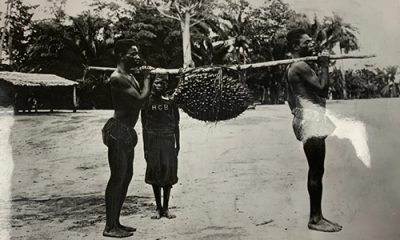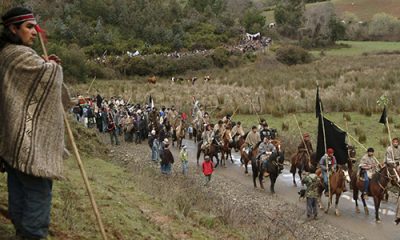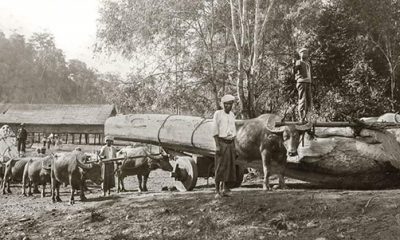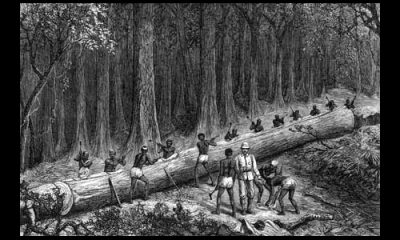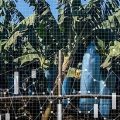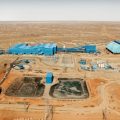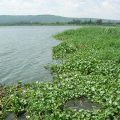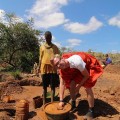SPECIAL REPORTS AND PROJECTS
No Concession at PETAR: Combating Privatization is a Women’s Struggle in Brazil
Published
3 years agoon
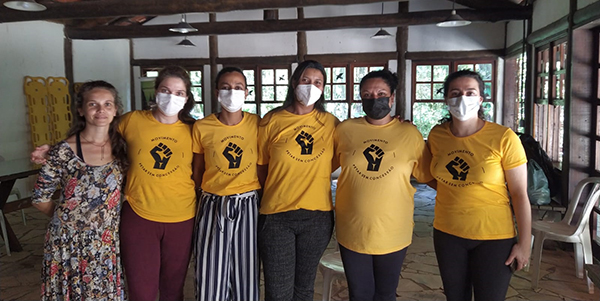
This text comes out of conversations with women from the Ribeira River Valley who have devoted themselves to opposing the concession of one of the region’s most important parks. Their struggle is fundamental, and part of diverse resistances against the privatizing trend of creating ‘territories without people’. They remind us that their territory has been and is rooted in their stories, voices and resistance.
We wrote this text with many hands, from conversations and elaborations by women from the territory of the Ribeira River Valley – between Brazil’s South and Southeast regions – who have devoted themselves to fighting against the concession (1) of one of the region’s most important parks, the Alto Ribeira Tourist State Park (PETAR, for its name in Portuguese). The park, located in Iporanga and Apiaí municipalities, is currently administered by the São Paulo state government, and was included in a concessions plan together with other conservation units. This allows private companies (national or international) to gain the right to exploit commercially the part of the territory where the main tourist attractions are concentrated.
The Ribeira River Valley is the region in Brazil that harbors the largest portion of the Atlantic Forest biome, of which 70% is preserved. While in most of the country this biome was destroyed by megaprojects and real estate speculation, in the Ribeira River Valley local communities’ relation with and defense of the forest have contributed to its maintenance. Since last century, the conservation policy conceived to house this biodiversity has been a policy ‘without people’, which created many parks and conservation units that restrict the ways of life of communities (2) in the territory. Only more recently, and through struggle, have some areas gone over to what is termed sustainable use areas. These units are of a type created by Brazil’s National Conservation Units System, and were meant to operate under a regime that tolerates the presence of communities in the territories. This is not entirely the case in practice, seen as even in these locations there are many conflicts between people’s ways of life and the rules of Conservation Units. As a rule, the way environmental and land issues are resolved in the Ribeira River Valley is through the expulsion – forced or by wearing down – of the communities that inhabit it.
Advances in terms of the implementation of more sustainable use areas – where one can practice traditional agriculture, even though permission is required – have allowed communities to remain on the territory. But their real demand has always been the regularization of land ownership. Although they have inhabited the territory for centuries, most communities do not have their lands demarcated or deeds for them, which generates great insecurity. Land conflicts have worsened in Brazil with new policies of digitalization of territorial organization, like the Rural Environmental Registry (CAR) (3). In other words, these communities continue to this day fighting for their right to land, as well as fighting in parallel against the environmental policy, especially in the parks.
Privatizing the concession for 30 years: displacements, insecurity and gentrification
This is the case of quilombola and cabocla communities in Iporanga municipality that were superimposed by the Alto Ribeira Tourist State Park (PETAR). Ana Ercilia – a resident of Iporanga since her childhood, environmental monitor and involved in the current struggle against the concession of the park to the private sector – relates that in 1958, at the time when the park was created, people from the territory believed it would be an amusement park, such was the absence of dialogue and transparency of the authorities vis-à-vis the communities. After some time, they came to understand the actual kind of park that had arrived at the territory, already by then owing to restrictions in access to services like electricity, and when people started being prevented from upgrading or enlarging their own homes and yards. Since then, there began a struggle to push back PETAR’s limits to no longer include Bairro da Serra, a district that was ‘cut in half’ when the park was established. Much of its territory ended up inside the park. Bairro da Serra harbors both traditional communities and long-standing residents of Iporanga, as well as important items of Ribeira River Valley’s historical and cultural heritage. The struggle of the dwellers, through their association, ensured an agreement that redrew the park limits so that people’s homes stayed outside the zone with restrictions. However, the farmland remained inside the conservation unit, which greatly restricted people’s way of life and meant that tourism work became families’ only source of income.
The park limits were redrawn but the land ownership regularization of the Bairro da Serra community did not happen. Several families have been displaced by the park to this district, which is in PETAR’s surrounding buffer zone, but the displacement was not accompanied by deeds to the land. The families only have a provisional right to remain, which does not guarantee that the park will not resettle them. (4) This situation is particularly difficult for the women, whose work is concentrated in their own yards and who earn a living mostly from their work there and at various local business initiatives.
Currently, the communities are facing a new offensive onto the territory. The São Paulo state government, based on its privatist policy, has opened an international tender process for the concession of an area of the park – where most of the main tourist attractions are located – for a period of 30 years. This took place in the second half of 2021, already during the pandemic, and without any public consultation whatsoever. Since then, a broad resistance movement against the concession of the park has emerged.
The struggle against the concession is organized with the involvement of residents, peoples and communities, researchers, activists and supporters in general. Women make up a major share of this resistance. Based on their self-organization, they have demonstrated that they are particularly impacted when the government chooses to strengthen public-private partnerships in this way. The question of land regularization, for instance, is being completely ignored in this process. That a private company could literally own the territory for 30 years and that the families, especially the women, should continue to live with the insecurity of not owning their land is an aberration. It clearly demonstrates that the state’s intention in promoting this concession is not improving communities’ quality of life, as it alleges.
Even though the park was imposed upon the communities in the 1950s, over time they appropriated it as best they could. Owing to the intense restrictions placed on their way of life, one of the main sources of income that dwellers have today is community based, autonomously organized work in tourism as environmental monitors. Currently, there are 250 monitors registered with PETAR. Visitors usually hire them, and their presence is compulsory in the case of visits to the caves. They are residents of the communities and beyond presenting the park’s attractions they talk about the history of the Ribeira River Valley and the communities where they live. The organization of monitorship as paid work was part of the negotiations between the state government and the communities as an alternative source of income in the face of restrictions to the use of the territory and to customary practices that were turned into environmental crimes. One of the changes proposed in the privatization RFP specs is that tourists may self-guide inside the park, which would make it even harder for the environmental monitors to obtain an income, as they would cease to be essential to the tourists.
With the concession, communities – and especially women, who run the various small businesses in the area surrounding the park – will cease having a leading role in the tourism field. The concession holder will take on that role. For example, the concession plan involves greatly increasing the number of yearly visits to the park, creating trails for vehicles and publicizing new attractions. The women fighting the concession argue that with these initiatives the government wants to impose another type of tourism on the territory. Instead of people interested in getting to know the communities through the local guides, who are also sources of knowledge about local ways of life, it wants tourism organized by companies that are likely to prioritize the hiring of bilingual guides, for example, rather than members of the local community.
This tourism package undoes the “bread-winning flow”, a kind of economy constructed over time by the communities, which are themselves set to become just another tourist attraction. This new and extremely colonialist tendency has worsened under the neoliberal government of São Paulo state, which is implementing a development program called “Valley of the Future”. Communities other than the ones surrounding PETAR have been classed as tourist attractions by this program, including with signs on highways, without any kind of consultation or dialogue with the communities about this. So the community becomes a foreigner in its own territory. Gentrification, likely to happen via the construction of hotels and higher ticket prices – actions forecast in the concession process –, will make it impossible for community members to access the park, a place they know well and where they enjoy spending time.
The effect forecast is not the valuing of communities and the building of economic alternatives. Rather, people fear they will be pushed out of their territory more and more, and will find themselves forced to migrate to the peripheries of the surrounding cities, a trend already observed particularly among the young, who have not remained in the territory. Furthermore, for the ones that do remain, there is concern about increasing sexual violence and objectification of women’s bodies with the significant inflow of men from the outside. The concession of the park also has no matching measures in terms of improving the public policies that service the community. Given that the concession, if granted, will last 30 years, the women are especially concerned about their young children, who will spend their childhood, adolescence and early adult life in this privatized territory.
This privatization is taking place at the same time as the “Valley of the Future” project advances in the Ribeira River Valley, which also raises doubts as to how the exploitation of the territory will take place. The main front of this development project has so far been opening up the region to mining. (The whole region of Iporanga, including the area of PETAR, was exploited by mining in the past.) Since the concession process provides for the use and exploitation of the territory, this raises the suspicion that mining activities may return in certain parts of the territory, including inside PETAR. After all, as the women state, when it comes to these projects “everything is connected and stitched up in advance”.
In the legal sphere, this whole process has been conducted on the basis of approvals granted in the dead of night, with no participation by communities directly affected. The state government has gone as far as using documents from other meetings (minutes, photos) to claim that consultations with the community about the concession were held. Due to the pandemic, health precautions become the alibi for not holding major public consultations. What has happened in practice is that hearings are deliberately hollowed out since they are proposed in an online format or in-person but in the state capital, in a context where dwellers lack internet access and the resources to travel. According to the specs, the actions to be developed by the company that wins the concession include activities that go against the park’s Management Plan. This unmasks the environmental racism involved in the privatization: if it means companies develop their business, the environmental impact studies need not be taken into account. Nevertheless, this way of conducting the concession, i.e., by disrespecting traditional communities’ right to prior, free and informed consultation (ILO Convention 169), has been understood by part of the Judiciary as valid, which has speeded up the process in spite of these irregularities.
In an even greater offensive than the state government of João Dória, in São Paulo, the federal government of Jair Bolsonaro launched on February 7, 2022, a decree for the concession/privatization of five Conservation Units. One of them, the Serra da Canastra National Park, was created during the military dictatorship and overlaps an area of 1,500 families of rural producers, including 43 communities and 550 traditional families, recognized as Canastreiros.
Women self-organize and resist
When nobody is being heard, least of all are the women. The spaces for participation are scarce and, moreover, tend to be set aside for just a few leaders – men, in general – who, owing to the patriarchal structure of the communities themselves, do not take women’s concerns, perceptions and arguments to the public debate. This, in addition to the disregard the State has shown towards the issue of participation, has made women unite in their own collective, from where they organize the fight against the concession from their self-organization. As well as enhancing the resistance based on a plurality of voices, women’s self-organized spaces have also been important as a form of self-care against the harassment that the State has undertaken over the course of the process, which has even caused mental illness and emotional distress among the communities.
What is evident is that the types of conservation ‘without-people’ that have been adopted as the model and that have for decades dictated the environmental policy of several countries, including Brazil, is very efficient for capital in the current historical period of expansion of its borders. The creation of territories without people means the creation of territories without resistance, where privatizing projects – as in the case of PETAR’s concession – can develop unfettered. We believe that the struggle against the concession in this case will be victorious because the communities of Iporanga have never accepted the fact that their own territory is not their property. Over time, given that the imposition of the park was a reality that could not be changed, they gradually became more and more its owners, appropriating means to live and create within that environment. However, they have always exposed what they see as wrong and fought over the still latent conflicts, like the absence of deeds to their land.
It is not by chance that the State’s concession plan provides for the closing of one of the park’s entrances via Iporanga municipality, even though this entrance greatly facilitates visits to one of the park’s top caves. It is an attempt to exclude the most resistant communities, making it no longer viable for them to access the park or work as environmental monitors. This reminds us that the history of the Ribeira River Valley has been the history of the erasure of the paths trodden by traditional communities, and the construction of paths that privilege the flow of capital. Federal highway BR-116 – a major highway that cuts in half many of the Ribeira River Valley’s municipalities and is responsible for much of the cargo haulage in Southeast Brazil – is an icon of this.
What we know is that the old paths never actually cease to be used, and that the elderly are especially concerned about reminding the young about where these paths pass, where they are and where they end up. The privatization project intends to uproot communities from their territory based on a re-architecture of such paths, but it is failing to take into account the capacity of resistance and inventiveness of the peoples that laid them.
Natália Lobo and Miriam Nobre – Sempreviva Organização Feminista, World March of Women – Brazil.
Jéssica Cristina Pires – Caiçara, quilombola, agroecology technician, representative of communities from Iporanga, PETAR Women’s Collective, Petar Without Concession Movement.
Paula Daniel Fogaça – Biologist; holds a master’s degree in Sustainability.
(1) In order to support the struggle organized by women against the privatization of PETAR and follow this movement, please access https://www.petarsemconcessao.minhasampa.org.br/ and sign the online petition.
(2) The Ribeira River Valley harbors a variety of traditional communities and peoples, like the Guarani Mbyá and Guarani Ñandeva indigenous peoples, and quilombola, caiçara and caboclo communities.
(3) The Rural Environmental Registry (CAR) is a tool created by Brazil’s new forestry code. It is a geo-referenced digital registry of the country’s rural territory. This instrument, which ought to guide the implementation of environmental policies, has been used and a document that justifies what has been termed digital land-grabbing in many countries of the Global South. To find out more, check here.
(4) For more information on the history of Bairro da Serra and relations between Iporanga’s traditional communities and PETAR, see “Florestas e lutas por reconhecimento: território, identidades e direitos na Mata Atlântica brasileira” by Pedro Castelo Branco Silveira. Available here.
Original Source: World Rainforest Movement
Related posts:
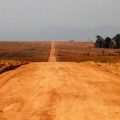
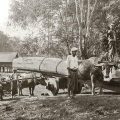 Forest Colonialism in Thailand
Forest Colonialism in Thailand
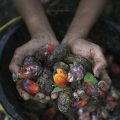 Sexual exploitation and violence against women at the root of the industrial plantation model
Sexual exploitation and violence against women at the root of the industrial plantation model
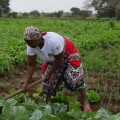 Africa must unlock the power of its women to save climate change
Africa must unlock the power of its women to save climate change
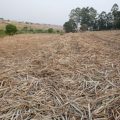 Campaigners lose court case to stop Ugandan forest clearance
Campaigners lose court case to stop Ugandan forest clearance
SPECIAL REPORTS AND PROJECTS
Activism on Trial: Despite the increasing repressive measures, Uganda’s EACOP protesters are achieving unexpected victories in the country’s justice systems.
Published
4 days agoon
July 8, 2025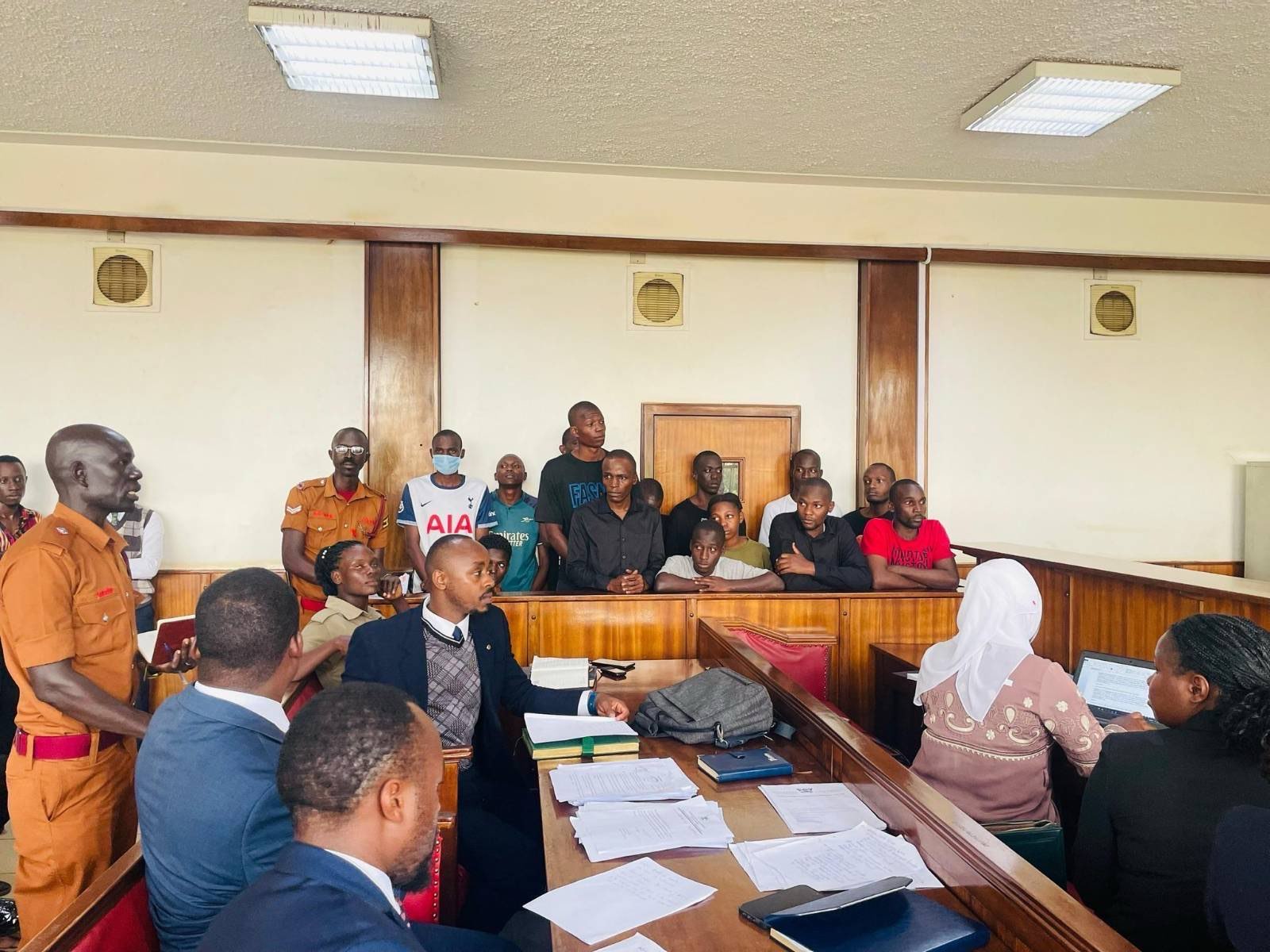
Special report by the dedicated and thorough Witness Radio team, offering a comprehensive and in-depth overview of the situation.
As Uganda moves forward with the controversial East African Crude Oil Pipeline (EACOP), a wave of arrests, intimidation, and court cases has targeted youth and environmental activists opposing the project. However, there is a noticeable and encouraging shift within Uganda’s justice systems, with a growing support for the protesters, potentially signaling a change in the legal landscape.
The EACOP project, stretching 1,443 kilometers from Uganda to Tanzania, has been hailed by the government as a development milestone. However, human rights groups and environmental watchdogs have consistently warned that the project poses serious risks to communities, biodiversity, and the climate. Concerns over land grabbing, inadequate compensation, and ecological degradation have mobilized a new generation of Ugandan activists.
Since 2022, as opposition to EACOP grew louder, Ugandan authorities have intensified a campaign of arrests and legal harassment. Police, military, and currently the Special Forces Command, a security unit tasked with protecting Uganda’s president, have been involved in brutal crackdowns on these activists.
Yuda Kaye, the mobilizer for students against EACOP, believes the criminalization is an attempt by the government to weaken their cause and silence them from speaking out about the project’s negative impacts.
“We are arrested just for raising the project concerns, which affect our future, the local communities, and the environment at large. Oftentimes, we are arrested without reason. They just round us up at once and brutally arrest us, Mr. Kaye reveals, in an interview with Witness Radio’s research team.
Activists have faced a litany of charges, including unlawful assembly, incitement to violence, public nuisance, and criminal trespass. Many of these charges have lacked substantive evidence and have been dismissed by the courts or had their files closed by the police after prolonged delays.
A case review conducted by Witness Radio Uganda reveals that Uganda’s justice system is being used to suppress the activities of youth activists opposing the project, rather than convicting them. However, despite the system being used to silence them, it has often found no merit in these cases.
Of a sample of 20 documented cases since 2022 involving the arrest of over 180 activists, 9 case files against the activists have either been dismissed by courts or closed by the police due to a lack of prosecution, another signal indicating the relevance of their work, while 11 cases remain ongoing.
The chart below shows trends in arrests, dismissed cases, and ongoing cases involving EACOP activists in Uganda from 2022 to May 2025.
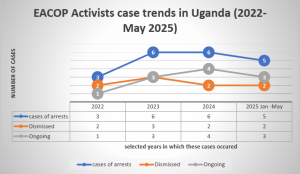
The review was conducted with support from the activists themselves and their lawyers. It involved a desk review and analysis of Witness Radio articles concerning the arrests of defenders and activists opposing the EACOP project.
Witness Radio’s analysis reveals a concerning trend as the majority of cases involving these activists are stalling at the police level rather than progressing to the courts of law. This suggests that the police have not only criminalized activism but are also playing a syndicate role in deliberately prolonging these cases under the excuse of ongoing investigations.
“While both the police and judiciary are being used to suppress dissent, the courts have at least demonstrated a degree of fairness, having dismissed at least 78% of cases that fall within their jurisdiction. In contrast, the police continue to hold 73% of activist cases in limbo, citing investigations as justification for indefinite delays.” The research team discovered.
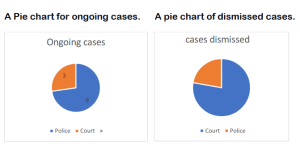
Witness Radio’s analysis further shows that in most of these cases, the state has failed to produce witnesses or evidence to convict the activists, adding that the charges are often just tools of intimidation. Additionally, this is accompanied by more extended periods during which decisions are being made.
Despite the intense crackdown, it is evident that these activists are winning, as no proven record of sentencing has been observed. Instead, these cases are often marred by delays in court or at the police, and in the end, some have been dismissed. This implies that protest marches and petition deliveries serve a purpose; the state just needs to listen to their concerns and formulate possible solutions to address them,” said Tonny Katende, Witness Radio Uganda’s Research, Media and Documentation Officer.
According to Article 29(1)(d) of the Constitution of Uganda, every individual has the right to “assemble and demonstrate together with others peacefully and unarmed and to petition.” Additionally, Article 20 emphasizes that fundamental rights and freedoms “are inherent and not granted by the State.” Yet activists report that police regularly deny them the right to exercise their rights as guaranteed.
At a February 2025 press conference, EACOP activists strongly condemned the police’s continued unlawful arrests of demonstrators exercising their constitutional rights and case delays. This followed escalating crackdowns that added to the tally of over 100 activists arrested in 2024 alone.
“We strongly condemn these arrests. Detaining demonstrators does not address the concerns affecting grassroots communities impacted by oil and gas projects,” declared the group, led by Bob Barigye, who remains in prison on another charge still linked to his opposition to EACOP.
An interview with Mr. Yuda Kaye, a mobilizer from the Students Against EACOP Movement, confirmed that the ongoing dismissals only reaffirm the legitimacy of their resistance.
“These cases are dismissed because the government and its justice systems don’t have any grounds to convict us. This justifies the fact that the issues we’re discussing are real. We only seek accountability, but since the government has power, they criminalize us and silence us,” Mr. Kaye added.
According to Kaye, the intimidation is real, but so is their commitment. “We are called enemies of progress, but we’re only protecting our future and that of our country. We’ve often proposed alternatives, but the government doesn’t want them.” He re-echoes.
Despite this, activists say their rights are routinely violated. Witness Radio Uganda attempted to contact the police spokesperson, Mr. Kituuma Rusooke, but known numbers were unreachable, and messages sent to him went unanswered.
In a separate interview with Mr. James Eremye Mawanda, the Judiciary Spokesperson, he acknowledged the pattern of dismissals and delays.
“As the Judiciary, we listen to cases, and where there is no evidence to support the case, a decision is made. When a crime is allegedly committed and an individual is brought before the court, the courts upholding the rule of law shall administer justice,” he said.
According to Witness Radio’s analysis, 2025 has seen the most dismissals so far, with six cases concluding, reinforcing the view that criminalization is used more for intimidation than as a means of legal redress. “Whereas the arrests took place in separate years, most of the dismissals have happened in 2025,” the research team further highlighted.
Mr. Brighton Aryampa, the team lead of Youth for Green Communities, one of the organizations that provide legal representation for Stop-EACOP activists, highlighted that the criminalization of Ugandan activists undermines Uganda’s democratic principles of free expression and open discourse.
“The government, in bed with oil corporations Total Energies and CNOOC, is deliberating using legal action against Stop EACOP activists to suppress dissent, free speech, right to peaceful protest, and against public participation. This is tainting Uganda as a country that undermines the democratic principles of free expression and open discourse, as hundreds of Stop EACOP activists have been arrested, charged, and some tried by a competent court. However, no one has been found guilty of the fabricated offense usually slapped on them.” He said in an interview with Witness Radio.
Counsel Aryampa further advised that the practice of powerful companies and businesses blackmailing and corrupting the Ugandan government to develop harmful projects while ignoring all social warnings and human rights abuses must be stopped.
The pressure exerted by these activists, both locally and internationally, has slowed the EACOP project. It has also led to bankers and insurers withdrawing from financing or insuring the project. According to Stop EACOP campaigners, more than 40 international banks and 30 global insurance firms, including Chubb, have distanced themselves from the controversial pipeline project, citing human rights and climate concerns raised by these activists.
Meanwhile, as the activism grows, the number of arrests is rising. Within just the first six months of 2025, over 40 activists have been criminalized for their activism. Among them is KCB 11, a group of eleven activists that was arrested at the KCB offices in April 2025. The group has spent over two months on remand, despite their lawyers’ pleas for bail to be granted.
Related posts:

 EACOP activism under Siege: Activists are reportedly criminalized for opposing oil pipeline project in Uganda.
EACOP activism under Siege: Activists are reportedly criminalized for opposing oil pipeline project in Uganda.
 EACOP: The trial of 20 environmental activists failed to take off, and now they want the case dismissed for lack of prosecution.
EACOP: The trial of 20 environmental activists failed to take off, and now they want the case dismissed for lack of prosecution.
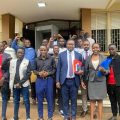 Milestone: Another case against the EACOP activists is dismissed due to the want of prosecution.
Milestone: Another case against the EACOP activists is dismissed due to the want of prosecution.
 The latest: Another group of anti-EACOP activists has been arrested for protesting Stanbic Bank’s financing of the EACOP Project.
The latest: Another group of anti-EACOP activists has been arrested for protesting Stanbic Bank’s financing of the EACOP Project.
SPECIAL REPORTS AND PROJECTS
‘Left to suffer’: Kenyan villagers take on Bamburi Cement over assaults, dog attacks
Published
4 months agoon
March 22, 2025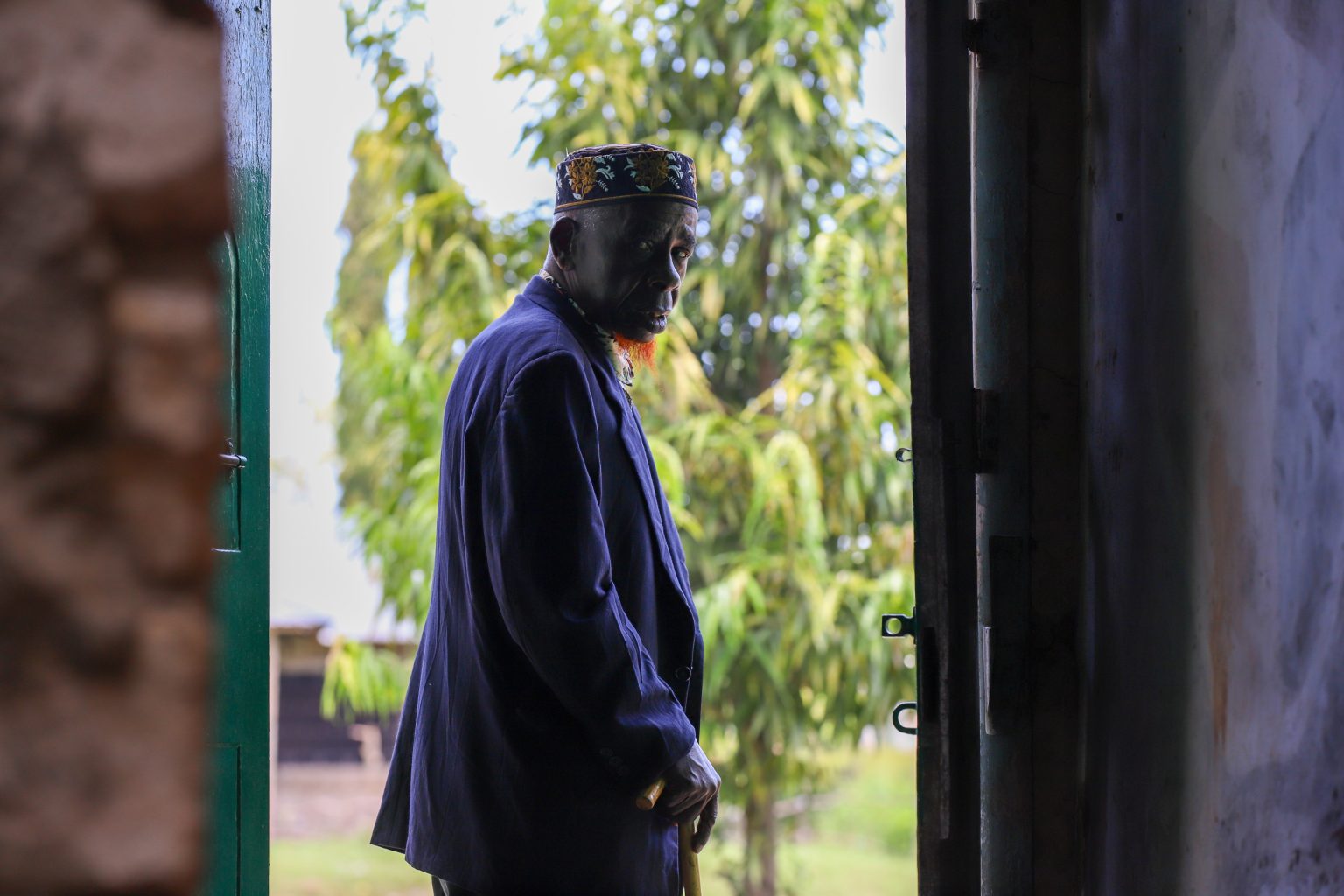
- The victims are aged between 24 and 60, and one of them has since passed on.
- Many were severely injured and hospitalized following brutal attacks, unlawful detention, and physical assault by Bamburi’s security personnel.
Editor’s note: Read the petition here.
Their hopes for justice seemed to be slipping away after initially taking on a multinational corporation and failing to hold it accountable for the brutal injuries they suffered.
The death of one of their own cast a shadow of despair, making it seem unlikely that they would ever bring the corporation to justice for the crimes they alleged.
However, 11 victims of dog attacks, assaults, and other severe human rights violations are now challenging Bamburi Cement PLC’s role in these abuses in court.
They are represented by the Kenya Human Rights Commission (KHRC), which on January 29, 2025, filed a legal claim before a constitutional court in Kenya, seeking to hold the multinational accountable for the harm suffered by the victims—residents of land parcels in Kwale that Bamburi claims ownership of. KHRC worked with the Kwale Mining Alliance (KMA) to bring this case.
The victims, aged between 24 and 60, include Mohamed Salim Mwakongoa, Ali Said, Abdalla Suleiman, Hamadi Jumadari, Abdalla Mohammed, and Omari Mbwana Bahakanda. Others are Shee Said Mbimbi, Omar Mohamed, Omar Ali Kalendi (deceased), Abdalla Jumadari, and Bakari Nuri Kassim.
Bamburi had hired a private security firm and deployed General Service Unit (GSU) officers to guard three adjoining land parcels, covering approximately 1,400 acres in Denyenye, Kwale. The GSU established a camp on the land, which has historically been accessed by residents who have long used established routes to reach the forest and the Indian Ocean.
For decades, these routes provided them with access to resources such as firewood, crops, and fish, which they relied on for their livelihoods. However, five years ago, when they attempted to collect firewood, harvest crops, and access the ocean through the land, Bamburi accused them of trespassing. The company’s private guards and GSU officers responded with force, setting dogs on them and assaulting them.
Many were severely injured and hospitalized following brutal attacks, unlawful detention, and physical assault by Bamburi’s security personnel. These incidents occurred despite the lack of clearly defined boundaries and the fact that the traditional access routes had never been contested.
According to the petition, GSU officers and private guards inflicted serious injuries by kicking, punching, and beating the victims with batons. Those who were arrested were neither taken to a police station nor charged with any offense. Despite their injuries, they were denied emergency medical care.
These actions were intended to intimidate residents, prevent them from accessing the beach, and suppress any historical claims to the land, the victims tell the court. Local police in Kwale failed to investigate the abuses, visit the crime scenes, or arrest any of the perpetrators, they add.
Now, the victims are seeking compensation for these violations. They have also asked the court to declare that their rights were violated through torture inflicted by Bamburi’s guards and GSU officers. Additionally, they want the court to rule that releasing guard dogs to attack them during arrests constituted an extreme and unlawful use of force.
Source: khrc.or.ke
Related posts:

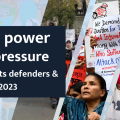 Breaking: Over 600 attacks against defenders have been recorded in the year 2023 globally- BHRRC report.
Breaking: Over 600 attacks against defenders have been recorded in the year 2023 globally- BHRRC report.
 Kaweeri Coffee land grabbing case re-trial resumes as evictees continue to suffer gross human rights violations.
Kaweeri Coffee land grabbing case re-trial resumes as evictees continue to suffer gross human rights violations.
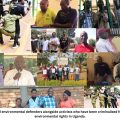 Criminalization of planet, land, and environmental defenders in Uganda is on the increase as 2023 recorded the soaring number of attacks.
Criminalization of planet, land, and environmental defenders in Uganda is on the increase as 2023 recorded the soaring number of attacks.
 Local land grabbers evict villagers at night; foreign investors cultivate the same lands the next day
Local land grabbers evict villagers at night; foreign investors cultivate the same lands the next day
SPECIAL REPORTS AND PROJECTS
River ‘dies’ after massive acidic waste spill at Chinese-owned copper mine
Published
4 months agoon
March 22, 2025A catastrophic acid spill from a Chinese-owned copper mine in Zambia has contaminated a major river, sparking fears of long-term environmental damage and potential harm to millions of people.
The spill, which occurred on February 18, has sent shockwaves through the southern African nation.
Investigators from the Engineering Institution of Zambia revealed that the incident stemmed from the collapse of a tailings dam at the mine.
This dam, designed to contain acidic waste, released an estimated 50 million litres of toxic material into a stream feeding the Kafue River, Zambia’s most important waterway.
The waste is a dangerous cocktail of concentrated acid, dissolved solids, and heavy metals.
The Kafue River, stretching over 930 miles (1,500 kilometres) through the heart of Zambia, supports a vast ecosystem and provides water for millions. The contamination has already been detected at least 60 miles downstream from the spill site, raising serious concerns about the long-term impact on both human populations and wildlife.
Environmental activist Chilekwa Mumba, working in Zambia’s Copperbelt Province, described the incident as “an environmental disaster really of catastrophic consequences”.
The spill underscores the risks associated with mining, particularly in a region where China holds significant influence over the copper industry.
Zambia ranks among the world’s top 10 copper producers, a metal crucial for manufacturing smartphones and other technologies.
Zambian President Hakainde Hichilema has appealed for expert assistance to address the crisis. The full extent of the environmental damage is still being assessed.
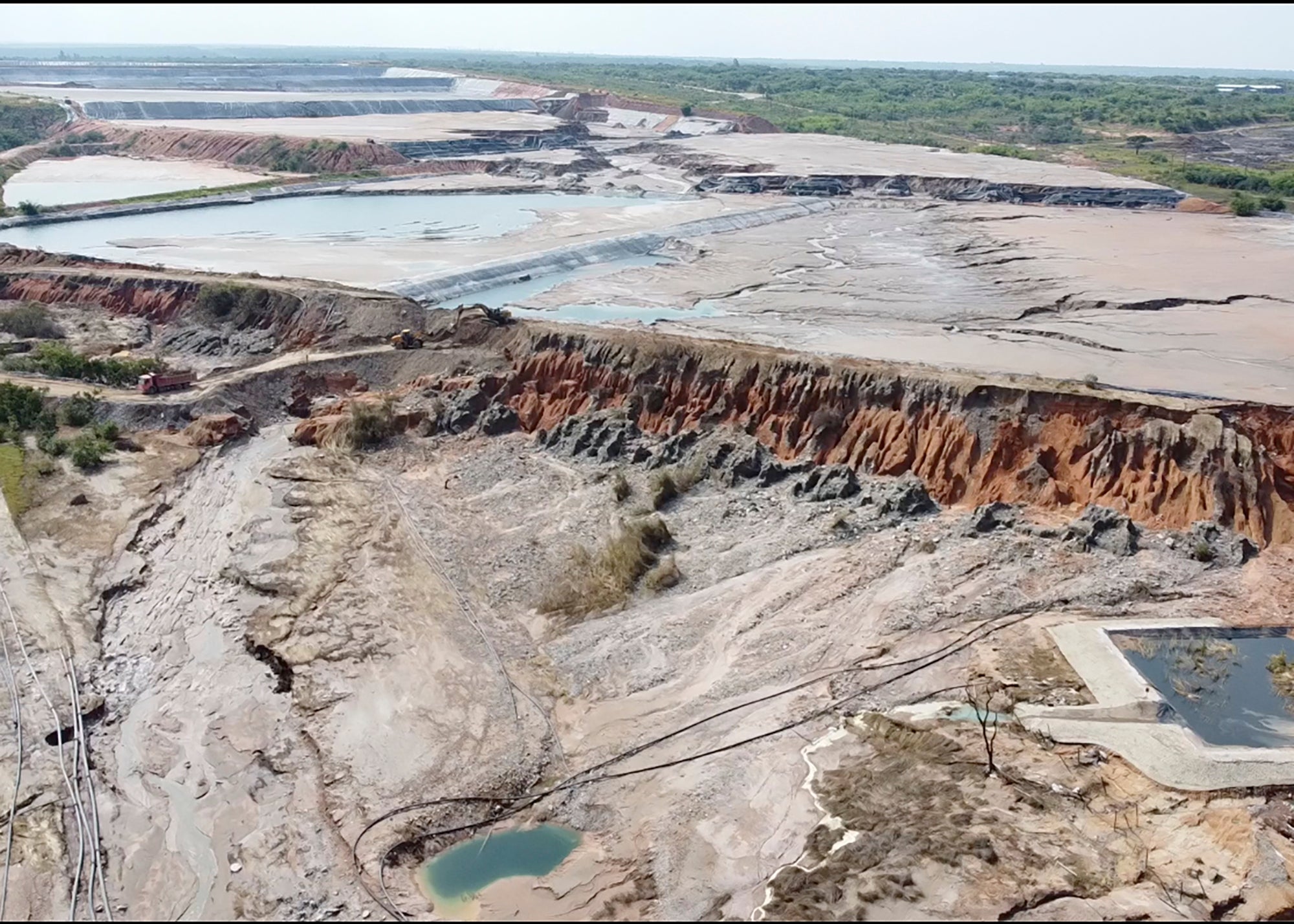
A river died overnight
An Associated Press reporter visited parts of the Kafue River, where dead fish could be seen washing up on the banks about 60 miles downstream from the mine run by Sino-Metals Leach Zambia, which is majority owned by the state-run China Nonferrous Metals Industry Group.
The Ministry of Water Development and Sanitation said the “devastating consequences” also included the destruction of crops along the river’s banks. Authorities are concerned that ground water will be contaminated as the mining waste seeps into the earth or is carried to other areas.
“Prior to February 18 this was a vibrant and alive river,” said Sean Cornelius, who lives near the Kafue and said fish died and birdlife near him disappeared almost immediately.
“Now everything is dead, it’s like a totally dead river. Unbelievable. Overnight, this river died.”
About 60 per cent of Zambia’s 20 million people live in the Kafue River basin and depend on it in some way as a source of fishing, irrigation for agriculture and water for industry. The river supplies drinking water to about five million people, including in the capital, Lusaka.
The acid leak at the mine caused a complete shutdown of the water supply to the nearby city of Kitwe, home to an estimated 700,000 people.
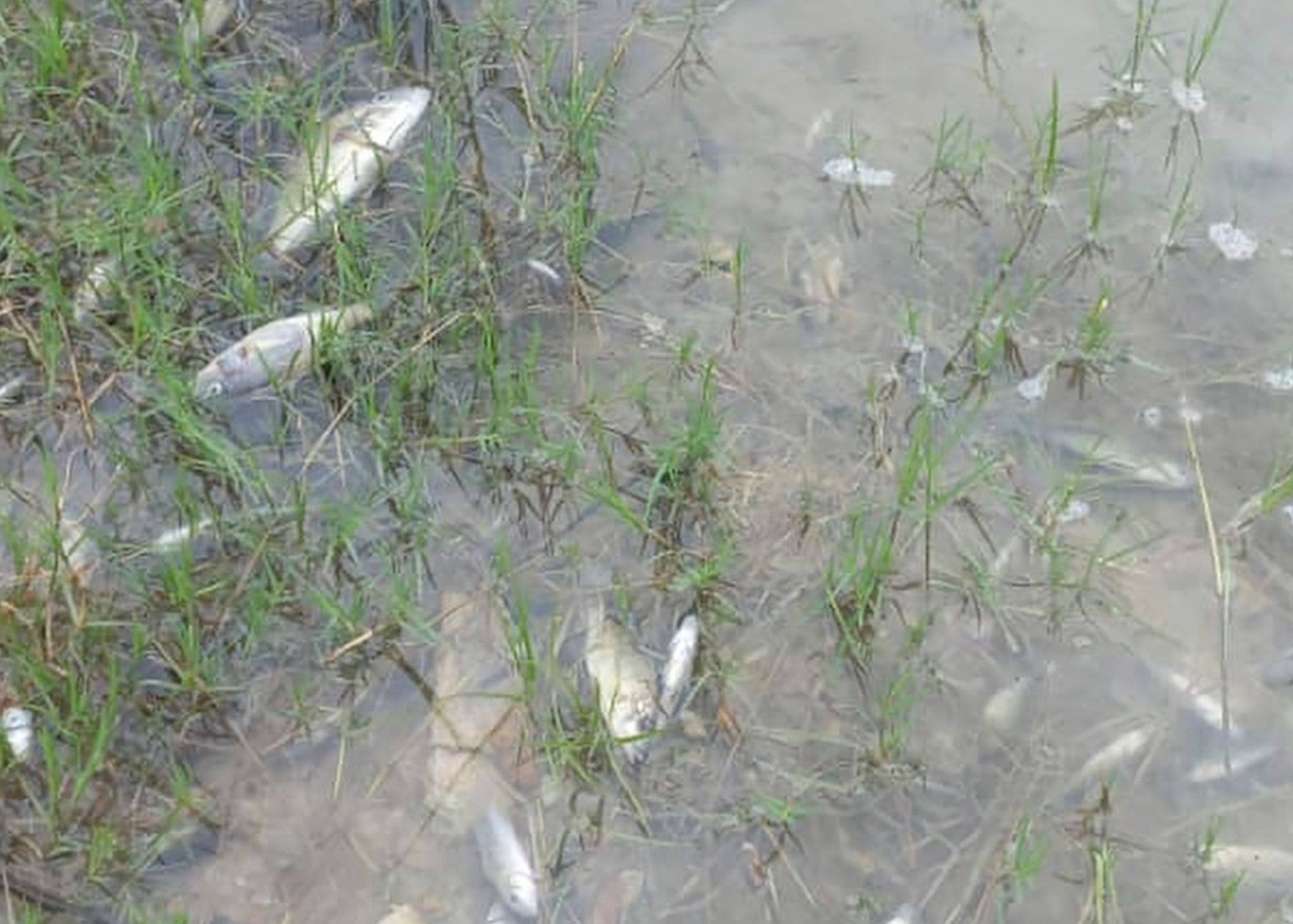
Attempts to roll back the damage
The Zambian government has deployed the air force to drop hundreds of tons of lime into the river in an attempt to counteract the acid and roll back the damage. Speed boats have also been used to ride up and down the river, applying lime.
Government spokesperson Cornelius Mweetwa said the situation was very serious and Sino-Metals Leach Zambia would bear the costs of the cleanup operation.
Zhang Peiwen, the chairman of Sino-Metals Leach Zambia, met with government ministers this week and apologized for the acid spill, according to a transcript of his speech at the meeting released by his company.
“This disaster has rung a big alarm for Sino-Metals Leach and the mining industry,” he said.
It “will go all out to restore the affected environment as quickly as possible”, he said.
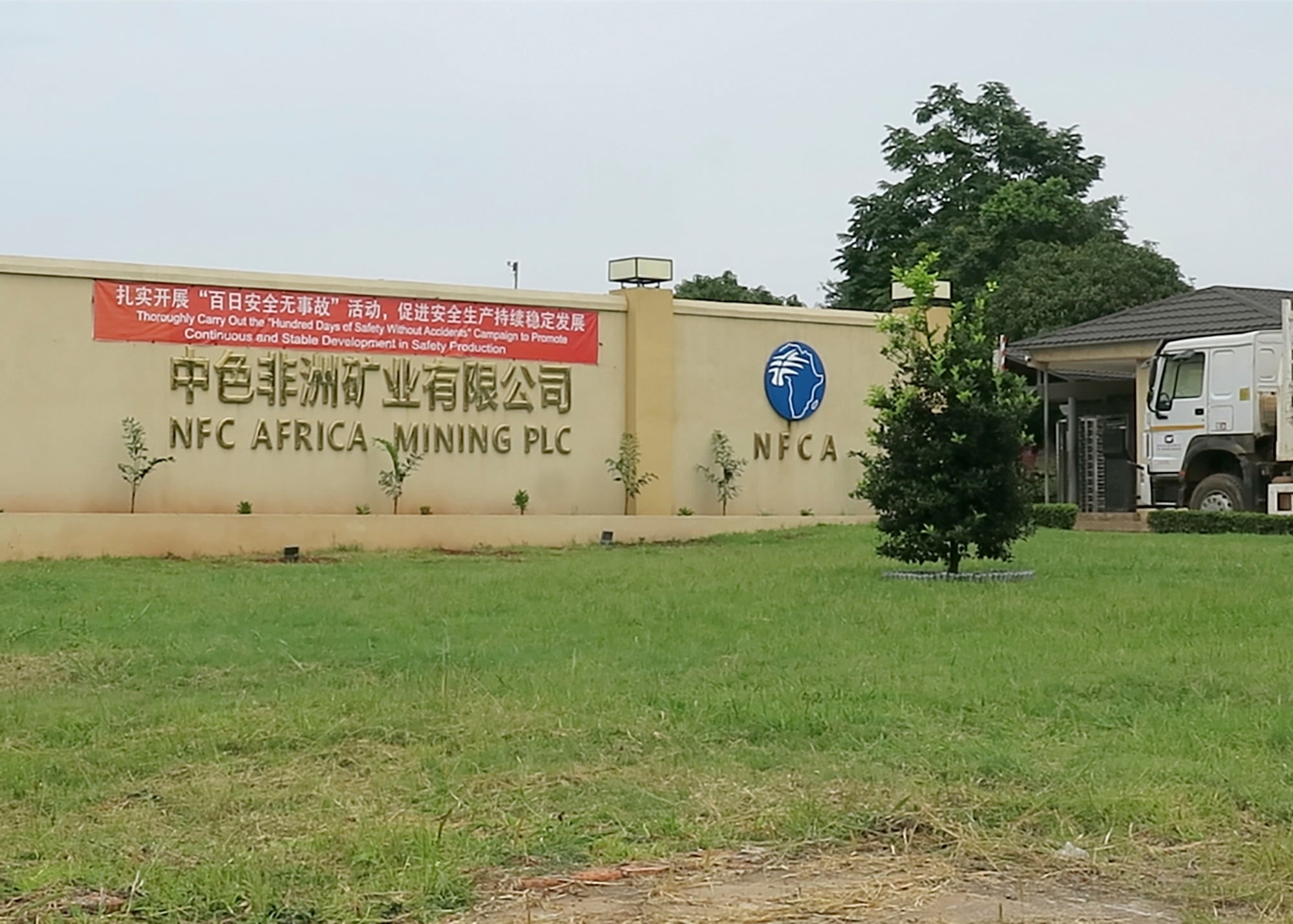
Discontent with Chinese presence
The environmental impact of China’s large mining interests in mineral-rich parts of Africa, which include Zambia’s neighbors Congo and Zimbabwe, has often been criticised, even as the minerals are crucial to the countries’ economies.
Chinese-owned copper mines have been accused of ignoring safety, labour and other regulations in Zambia as they strive to control its supply of the critical mineral, leading to some discontent with their presence.
Zambia is also burdened with more than $4 billion in debt to China and had to restructure some of its loans from China and other nations after defaulting on repayments in 2020.
A smaller acid waste leak from another Chinese-owned mine in Zambia’s copper belt was discovered days after the Sino-Metals accident, and authorities have accused the smaller mine of attempting to hide it.
Local police said a mine worker died at that second mine after falling into acid and alleged that the mine continued to operate after being instructed to stop its operations by authorities. Two Chinese mine managers have been arrested, police said.
Both mines have now halted their operations after orders from Zambian authorities, while many Zambians are angry.
“It really just brings out the negligence that some investors actually have when it comes to environmental protection,” said Mweene Himwinga, an environmental engineer who attended the meeting involving Mr Zhang, government ministers, and others.
“They don’t seem to have any concern at all, any regard at all. And I think it’s really worrying because at the end of the day, we as Zambian people, (it’s) the only land we have.”
Source: www.independent.co.uk

Activism on Trial: Despite the increasing repressive measures, Uganda’s EACOP protesters are achieving unexpected victories in the country’s justice systems.

Communities Under Siege: New Report Reveals World Bank Failures in Safeguard Compliance and Human Rights Oversight in Tanzania

A decade of displacement: How Uganda’s Oil refinery victims are dying before realizing justice as EACOP secures financial backing to further significant environmental harm.

Carbon Markets Are Not the Solution: The Failed Relaunch of Emission Trading and the Clean Development Mechanism

A decade of displacement: How Uganda’s Oil refinery victims are dying before realizing justice as EACOP secures financial backing to further significant environmental harm.

Govt launches Central Account for Busuulu to protect tenants from evictions

Activism on Trial: Despite the increasing repressive measures, Uganda’s EACOP protesters are achieving unexpected victories in the country’s justice systems.

Despite harsh repression, opposition to the EACOP pipeline in Uganda remains strong

Innovative Finance from Canada projects positive impact on local communities.
Over 5000 Indigenous Communities evicted in Kiryandongo District
Petition To Land Inquiry Commission Over Human Rights In Kiryandongo District
Invisible victims of Uganda Land Grabs
Resource Center
- LAND GRABS AT GUNPOINT REPORT IN KIRYANDONGO DISTRICT
- RESEARCH BRIEF -TOURISM POTENTIAL OF GREATER MASAKA -MARCH 2025
- The Mouila Declaration of the Informal Alliance against the Expansion of Industrial Monocultures
- FORCED LAND EVICTIONS IN UGANDA TRENDS RIGHTS OF DEFENDERS IMPACT AND CALL FOR ACTION
- 12 KEY DEMANDS FROM CSOS TO WORLD LEADERS AT THE OPENING OF COP16 IN SAUDI ARABIA
- PRESENDIANTIAL DIRECTIVE BANNING ALL LAND EVICTIONS IN UGANDA
- FROM LAND GRABBERS TO CARBON COWBOYS A NEW SCRAMBLE FOR COMMUNITY LANDS TAKES OFF
- African Faith Leaders Demand Reparations From The Gates Foundation.
Legal Framework
READ BY CATEGORY
Newsletter
Trending
-

 SPECIAL REPORTS AND PROJECTS4 days ago
SPECIAL REPORTS AND PROJECTS4 days agoActivism on Trial: Despite the increasing repressive measures, Uganda’s EACOP protesters are achieving unexpected victories in the country’s justice systems.
-

 NGO WORK1 week ago
NGO WORK1 week agoCommunities Under Siege: New Report Reveals World Bank Failures in Safeguard Compliance and Human Rights Oversight in Tanzania


